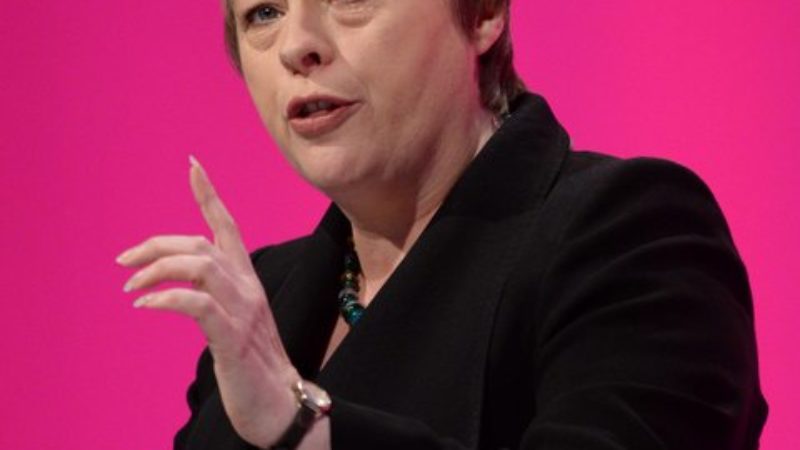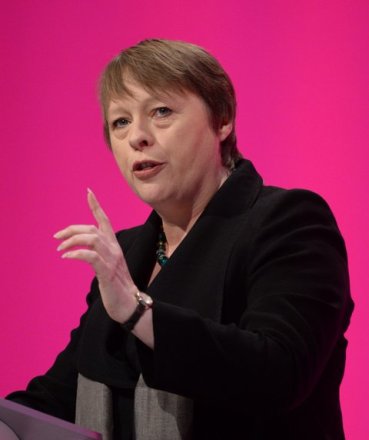
When you think of the more radical members of the Shadow Cabinet, who do you think of? Maybe Jon Cruddas? Perhaps Jon Trickett? Or maybe no-one at all. But perhaps Maria Eagle is one of the radicals at the Shadow Cabinet table. She’s certainly keener on market intervention than many in Miliband’s Shadow Cabinet. As Shadow Transport Secretary she was known to be actively considering ways of renationalising the rail network, before she moved on to Shadow DEFRA, where she’s currently getting stuck into the water companies.
Today Ofwat announce the prices that water companies can charge over the next five years – so a few days ago I met up with Eagle in her Westminster office to talk about her role in the Shadow Cabinet. I’m particularly interested to know why she’s so keen to get involved with markets – something that for many years pre-Miliband the party leadership was hesitant about for fears of being labeled “old Labour”. Eagle tells me that it’s driven by the “egregious behavior” of the sectors and companies that she’s been looking at, tackling “bad behaviour of the rail companies and the nonsense of the structure that we’ve inherited in privatisation”.

Eagle clearly got stuck into the Transport brief – perhaps unsurprisingly, Barbara Castle is her hero – and many in the party (and also in the transport unions) were disappointed when she was moved on. I ask Eagle if this bothered her, especially when she’d put so much work into the brief – but she’s surprisingly sanguine about it:
“The leader chooses who does these jobs. I was pleased to have delivered a full suite of policy options for rail and public transport more generally and wider actually, active travel too. I had a full set of policies that I think if we took them up will work really well and will show the difference between us and the Tories and it was nice to have got to a stage where that policy was there.”
“Of course you know it’s always a bit disrupting to suddenly be asked to do something else when you’re enjoying doing what you’re doing. But that’s not my call you know. I mean I’ve now got stuck into the DEFRA brief; maybe I’m just going for the full set.”
I do a quick count afterwards, she’s worked either in government or in opposition across at least 9 different departments. That’s not far off the full set already. For now though there are no more moves on the horizon, and she’s taken the lessons from the transport brief into the DEFRA role – but this time it’s water companies rather than train franchises in her sights. Like rail privatisation, Eagle clearly views the privatisation of water companies – and the creation of unresponsive monopolies – as a failure:
“We were told that prices had come down and that all the investment would be done, there’d be all this modernisation, but the reality is that water bills have gone up by 50% in that time and they’re definitely adding to the cost of living crisis that everybody is feeling.”
Eagle says there’s a great deal of “exploitative behavior” in the industry and that “increasingly the companies are structuring themselves in a way that enables them to avoid paying tax”, which leads to them acting as “money extraction machines”. But although she accepts that there are benefits that come from utilities being publicly owned, she’s not in favour of that approach for the water companies right now – saying instead that “a regulatory approach is the way to go”.
For her, the need to act on broken markets isn’t ideological, academic or rhetorical, it’s based on the real life experiences of her constituents. Similarly, when she tells me that her constituents talk about a cost of living crisis, it doesn’t sound like a reheated soundbite:
“The thing that I get most often when I knock on doors is, Maria we’ve got to get rid of this lot. Because if you were to ask I think a decent number of people in Liverpool what they think of this government as compared to the Thatcher government – which, by the way the Thatcher government doesn’t have a good reputation in Liverpool – the answer is always this one’s worse.”
Eagle acknowledges that’s a strong statement coming from a Liverpool MP, but later on in our discussion she goes even further, saying of the government “These people don’t give a damn about Liverpool”:
“I feel a tremendous responsibility to make sure that we offer a proper alternative that can relieve the pressure that many of my constituents are feeling. I mean the food bank use, zero hours contracts, people not being able to live on the money that they earn, kids particularly not having jobs…these things are a real, real pressure.”
Eagle certainly seems to be doing her best to help provide that “proper alternative” to the Tories. Across two different opposition briefs she’s been willing to take on failing privatised public services. She may well be one of the radicals in Miliband’s orbit after all. More power to her elbow.




More from LabourList
Turning the page? Labour’s recovery in the polls show a path to 2029 victory
Restoration announce recommendations for NEC candidates
‘Factionalism at the top is weakening Labour – and handing a gift to Reform’